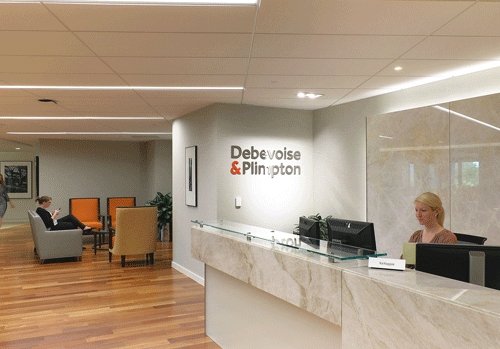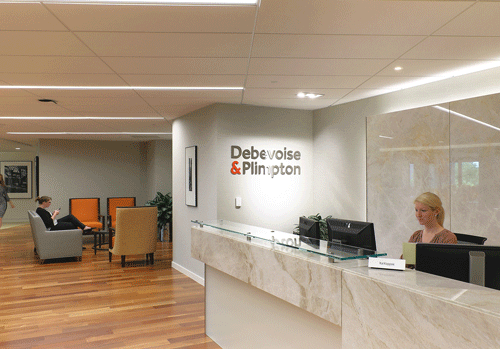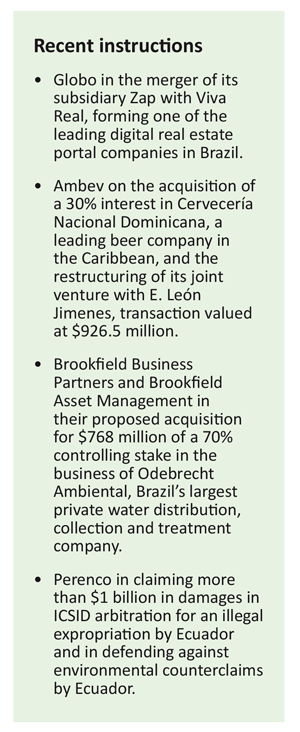In for the long haul

 Debevoise & Plimpton prides itself on its highly-specialised, cross-disciplinary approach. It is also one of the few New York firms shunning a ground presence in Latin America. For now…
Debevoise & Plimpton prides itself on its highly-specialised, cross-disciplinary approach. It is also one of the few New York firms shunning a ground presence in Latin America. For now…
Debevoise has 650 lawyers in nine offices across three continents but, bucking the trend of other New York-based competitors, none in Iberia or Latin America. Choosing to focus on the most complex, global mandates might not be an obstacle to market recognition in key countries such as Brazil. “We have boots on the ground in Latin America so frequently, providing the highest quality of service, that many of our clients assume we have an office there,” Mauricio Levi-Minzi, co-leader of the practice group, says. The firm has periodically looked into opening an office in Latin America but it is not the best strategy for the clients or the practice at the moment, he adds.  The “fly in and out” strategy advising clients in emerging markets is shared with many other international law firms. However, some of Debevoise’s peers have eventually launched in presence in key outposts in Latin America, particularly in Sao Paulo. These satellite offices might not be able to practice local law but they serve to keep a closer eye on the market.
The “fly in and out” strategy advising clients in emerging markets is shared with many other international law firms. However, some of Debevoise’s peers have eventually launched in presence in key outposts in Latin America, particularly in Sao Paulo. These satellite offices might not be able to practice local law but they serve to keep a closer eye on the market.
In the case of Debevoise, most of the Latin America practice group operates out of its New York headquarters, drawing up talent from other offices such as London, Paris or even Tokyo as required.
Furthermore, having no office on the ground gives the team the opportunity to partner with some of the best lawyers in Latin America and build a network across key markets, Dietmar Prager, who co-leads the practice with Levi-Minzi, adds. Clients sometimes come to the table with the local counsel and that gives the team the chance to work with old friends and colleagues or to meet new lawyers, so it expands the network, he says. “We tend to know the market very well so clients regularly ask for recommendations.”
Also the team does not have a `preferred list´ of law firms to work with in Latin America, Levi-Minzi says. “We consider best local counsel for our client in a particular matter, choosing or recommending the law firm best suited to deliver the best care to our clients.”
Beyond the strong connections the practice group has built in the region over the years, the firm also boasts an international associate programme, which regularly brings young, promising lawyers from Latin America to work alongside the team in New York. This programme is quite effective, Levi-Minzi says, resulting in new “ambassadors for Debevoise in the region.”
Programmes like this are not unique to Debevoise and many Latin American law firms are delighted to place lawyers with global counterparts on rotating basis, as part of building up close relationships and referral networks with the elite New York law firms.
 Two-pronged approach
Two-pronged approach
The Latin America practice group is home to over 20 partners plus 30 associates and counsel and its co-leaders come from two distinctive practice areas, M&A and arbitration. “We learn from each other and project those core capabilities to the wider market,” says Levi-Minzi, an M&A lawyer with more than 20 years of experience working in cross-border transactions. He leads the team with Prager, a specialist in international arbitration and litigation with a strong focus on Latin America.
“Spanish or Portuguese language capability is a must to work on most Latin American matters,” Prager says, underlining that language skills and multicultural backgrounds are now key for the practice. This is partially due to the growth of international arbitration cases in Latin America which are conducted with Spanish or Portuguese as a key language due to the background of the clients or witnesses involved in the matter. “This is well liked in the region, as is our long standing experience handling complex M&A transactions and directly working with clients in their language,” Levi-Minzi adds.
Clients are also attracted to Debevoise’s track record in the region, Levi-Minzi says, pointing out to the team’s long-term relationships with large clients in the region and outside, some dating back 50 years.
For Prager, the firm´s consistent quality of work, solid bench and long standing expertise remain its unique selling point. “Take Brazil for example, our market recognition is linked to our exposure and experience; we have worked in that country since the first international arbitration cases, before it was fashionable!” he says. Levi-Minzi adds that the team has deep knowledge of the emerging markets in the region, the issues which might arise, and the expectations of global clients, all of which makes the firm well suited to assist new or returning clients. 
A high degree of specialisation is another calling card, Levi-Minzi says, “I am an M&A lawyer, that´s my focus and that´s what I do best, I am not trying to cover other fields.” Moreover, the team is also able to pool together expertise and talent from other areas quickly and efficiently as needed in complex transactions, he adds. In a recent transaction, the firm´s credentials in anti-bribery and corruption were on display as it advised a major client on a highly complex acquisition in Latin America.
The path ahead
The partners are optimistic about the region´s future prospects and workload for the team. “Latin America remains a market with growing opportunities, increasing foreign investment and rising middle class,” Levi-Minzi says. “At the moment, Brazil and the Pacific Alliance have the better prospects but we would love to see Argentina grow quicker, it has the potential,” he adds.
Prager notes that there are certain trends in the market generating more work for the team: an increase in infrastructure-related disputes and the more prominent role of Asian investment in the region. “Also, it is positive that more Latin American law firms have become well-versed in international arbitration, which is more exciting to us as we gain true partners to co-counsel with and not just a local team handling local issues.” He adds that there is a sophisticated arbitration bar in key Latin American countries, with arbitrators in Brazil, Colombia, Chile or Mexico sitting in proceedings that are not related to their home countries or the region.
Levi-Minzi underlines that local law firms in Latin America are increasingly capable of doing high level deals; the level of complexity they can handle has increased. As clients are doing more sophisticated global transaction, they demand more from their local lawyers. He also notes that private equity companies are doing more deals in Latin America which, in turn, brings more New York-style tools, systems, technology and requirements to the local market so lawyers have to be ready for that.
Levi-Minzi also points to Latin American companies diversifying outside the region and becoming more global, which might be a great opportunity for Debevoise. “We look forward to working on that expansion,” he says.
Capitalising on opportunities in Latin America by flying in and out from New York is part of doing business in other markets for global law firms. For some, after securing the right client or when the right partner becomes available, opening an office in the region becomes an imperative. For the time being, Debevoise is staying put.















